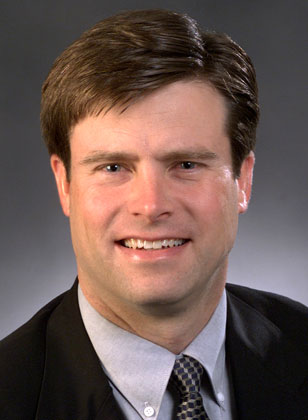Last modified: Tuesday, November 2, 2010
Aging with grace: Health care delivery model yields improved outcomes and lower costs
FOR IMMEDIATE RELEASE
Nov. 2, 2010
INDIANAPOLIS -- A model program developed at Indiana University to provide care to low-income older adults in their homes has earned recognition for its effective approach and cost-saving benefits in a leading national medical journal.

Dr. Steven Counsell, Mary Elizabeth Mitchell Professor of Geriatrics at the IU School of Medicine, IU Center for Aging Research center scientist and affiliated scientist of the Regenstrief Institute
A paper published in the Nov. 3 issue of the Journal of the American Medical Association praises a team approach developed by researchers from Indiana University and the Regenstrief Institute as one of three models with the greatest potential to improve the effectiveness and efficiency of the complex primary health care of older adults.
"Health-care reform is calling out for ways to improve health and lower costs. We have found a strategy to do that for a very vulnerable growing population in a way that shows cost savings over time and has the added benefit of providing services that these seniors desperately need but can't get elsewhere," said Dr. Steven R. Counsell, Mary Elizabeth Mitchell Professor of Geriatrics at the IU School of Medicine, IU Center for Aging Research center scientist and affiliated scientist of the Regenstrief Institute. "We appreciate recognition of our model of home-based geriatric care management for community-dwelling, low-income older adults as a model that is effective and efficient.
In a large clinical study, Geriatric Resources for Assessment and Care of Elders (GRACE) improved health and quality of life, decreased emergency department visits and lowered hospital admission rates in a group at high risk for hospital admission.
The key to GRACE is two teams. The support team, consisting of a nurse practitioner and a social worker, meets with each patient at his or her home to conduct an initial comprehensive geriatric assessment from the medicine cabinet to the kitchen cabinet. Based on the support team's findings, a larger interdisciplinary team (including a geriatrician, pharmacist, physical therapist, mental health social worker and community-based services liaison) develops an individualized care plan.
Then the ball is back in the support team's court. The nurse practitioner and the social worker meet with the patient's primary care doctor to come up with a health-care plan consistent with the patient's goals, such as maintaining the ability to participate in social and religious activities. The support team then works with the patient to implement the plan that contains strategies for medical issues of concern as well as elements related to maintaining quality of life. With the assistance of an electronic medical record and tracking system, the GRACE support team provides ongoing comprehensive care management.
"With GRACE we focused on the many issues faced by aging low-income adults -- access to needed services, medications, mobility, depression, transportation, nutrition, as well as other health issues of aging," said Counsell, who is a geriatrician. "Using a model based on our prior work, we were able to deliver care which was very popular with patients and their doctors, improved health outcomes, and saved money because it helped keep seniors from having to use the emergency department or be admitted to the hospital."
GRACE is cost effective. By it's second year, GRACE saved money for the sickest (those with three to four chronic diseases), and in the third year, a year after the home-based intervention ended, it saved even more. Results of the GRACE trial were published in the Dec. 12, 2007 issue of JAMA. The cost analysis of the GRACE model was published in the August 2009 issue of the Journal of the American Geriatrics Society.
Development of GRACE was funded by the National Institute on Aging, the Nina Mason Pulliam Charitable Trust and Wishard Health Services.
The IU School of Medicine and the Regenstrief Institute are located on the campus of Indiana University-Purdue University Indianapolis.
Chad Boult of Johns Hopkins Bloomberg School of Public Health and G. Darryl Wieland of Palmetto Health Richland Hospital highlighted GRACE in "Comprehensive Primary Care for Older Patients with Multiple Chronic Conditions: Nobody Rushes You Through" which appears in the Care of the Aging Patient: From Evidence to Action section of the Nov. 3 issue of JAMA, an issue that focuses on aging.